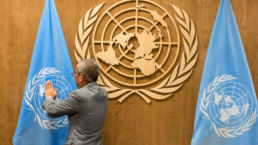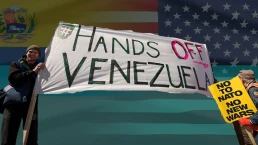The five permanent members of the Security Council — notably the U.S. and Russia — use their veto power to keep wars going.
by Jon Schwarz, The Intercept
On Wednesday, the United States was the only country to vote “no” on a proposed U.N. Security Council resolution authored by Brazil that called for “humanitarian pauses” in Israel’s bombing of Gaza. Twelve countries voted for the resolution, including several surprising ones, such as France and the United Arab Emirates. Two more, Russia and the U.K., abstained. But according to the Security Council’s rules, America’s sole “no” vote meant that the resolution failed.
Human Rights Watch criticized America’s actions, saying, “Once again the U.S. cynically used their veto to prevent the U.N. Security Council from acting on Israel and Palestine at a time of unprecedented carnage.”

The Security Council has 15 countries. Ten are rotating members, elected by the U.N. General Assembly and serving on the council for a period of two years. Five are permanent members: the U.S., Russia, China, France, and the U.K. If any of the permanent members vetoes a resolution, it will not pass, no matter how many votes are in favor. This means that any of the permanent members can veto any action by the Security Council.
Recent Posts
“The Blue Road To Trump Hell”: Norm Solomon On “How Corporate Democrats Paved The Way For Autocracy”
December 31, 2025
Take Action Now “If you don’t examine real history, then you’re in a cycle that repeats the same problems,” says Norman Solomon, director of…
Why is the Democratic party hiding its 2024 autopsy report?
December 30, 2025
Take Action Now If the DNC isn’t open and transparent about why they lost, then how can we be sure they will learn their lesson this time?By…
Anti-ICE Resistance Sprang Up Across Red States In 2025
December 29, 2025
Take Action Now In Texas, North Carolina, Alabama, Tennessee, Florida, and beyond, grassroots resistance to ICE is growing.By Sonali Kolhatkar,…
Trump Suggests US Bombed ‘Big Facility’ in Venezuela. No One Seems to Know What He’s Talking About
December 29, 2025
Take Action Now Administration officials have yet to provide any details about the supposed strike, which would mark a massive escalation in the…




